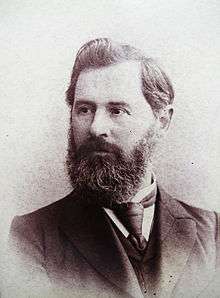Pavel Axelrod
| Pavel Axelrod | |
|---|---|
 | |
| Born |
25 August 1850 Pochep, Chernigov Governorate, Russian Empire |
| Died |
16 April 1928 (aged 77) Berlin, Prussia, Weimar Republic |

Pavel Borisovich Axelrod (Russian: Па́вел Бори́сович Аксельро́д; 25 August 1850 – 16 April 1928) was a Russian Menshevik.
Early life and career
Born Pinkhus Borukh (Russian: Пи́нхус Бо́рух) to a Jewish family in town of Potscheff[1] (a historic city of Pochep) in Chernigov Governorate (currently in Bryansk Oblast) and raised in Shklov and Mogilev in present-day Belarus, Axelrod was the son of a Lithuanian Jewish innkeeper. His parents were poor workers who lived in the Jewish poorhouse.[2]
In 1875 in Geneva, Axelrod married his former private student Nadezhda Ivanovna Kaminer. A student himself, Axelrod was Kaminer's and her sister 's tutor. Despite severe financial hardship during the first years, the marriage proved to be successful. They had three children: Vera (22.11.1875), Alexander (18.07.1879) and Sofia (14.11.1881). Nadezhda Ivanovna Axelrod-Kaminer died in 1906. To provide income for his family while in exile, Axelrod raised milk cows and produced his own kind of buttermilk which he then would sell and deliver himself to his customers.[3] Axelrod would argue politics over his milk cans.[4] His home was always a place of refuge for fugitives from Russia.[5]
In the mid-1880s Axelrod established his own small company producing kefir. By the end of the 1890s, Axelrod's company had offices in Zurich, Geneva, and Basel, which provided steady income and allowed him to support revolutionaries. In 1908, Axelrod sold his company in exchange for the retirement payments to him from the new owner.
Marxist revolutionary
Influenced by Mikhail Bakunin in his youth, he remained an Idealist even after adopting the Marxist philosophy of historical materialism. Axelrod joied the populist Black Repartition group, arguing in the journal Vol'noe Slovo that the Kiev pogrom was damaging to the proletariat,[6] before he co-founded the Marxist group Emancipation of Labor in Switzerland with his lifelong friend Georgi Plekhanov and Vera Zasulich in 1883. In 1900, Axelrod, Plekhanov and Zasulich joined forces with younger revolutionary Marxists Julius Martov, Vladimir Lenin and Alexander Potresov and the six edited Iskra, a Marxist newspaper, from 1900 to 1903. When Iskra supporters split at the Second Congress of the Russian Social Democratic Labor Party in 1903, Axelrod sided with the Menshevik faction against Vladimir Lenin's Bolsheviks.
In 1917, after the February Revolution Axelrod returned to Russia. By then some Mensheviks had already joined Kerensky's Provisional Government and supported government war policy. Despite all his efforts, Axelrod failed to gain Mensheviks' support for a policy of immediate peace negotiations with the Central Powers. After the Bolshevik victory, which Axelrod called a "historical crime without parallel in modern history", he toured the world rallying socialist opposition to the Bolsheviks.
Death
Axelrod died in exile in Berlin in 1928.
References
- Abraham Ascher. Pavel Axelrod and the Development of Menshevism, Harvard University Press, 1972, ISBN 0-674-65905-8, 420p.
- ↑ Isaac Deutscher,The Prophet Armed: Trotsky, 1879-1921 (Vintage Books: New York, 1965) p. 63.
- ↑ Ascher, Abraham (1972). Pavel Axelrod and the Development of Menshevism. Harvard University Press. p. 9. ISBN 978-0674659056.
- ↑ Isaac Deutscher, The Prophet Armed: Trotsky, 1879-1921, p. 64.
- ↑ Isaac Deutscher, The Prophet Armed: Trotsky, 1879-1921, p. 64.
- ↑ Isaac Deutscher, The Prophet Armed: Trotsky, 1879-1921, p. 64
- ↑ Shindler, Colin (2012). Israel and the European Left. New York: Continuum. p. 4.